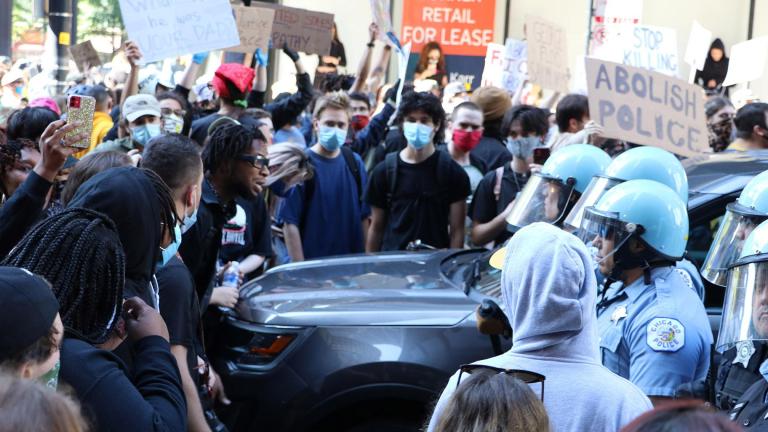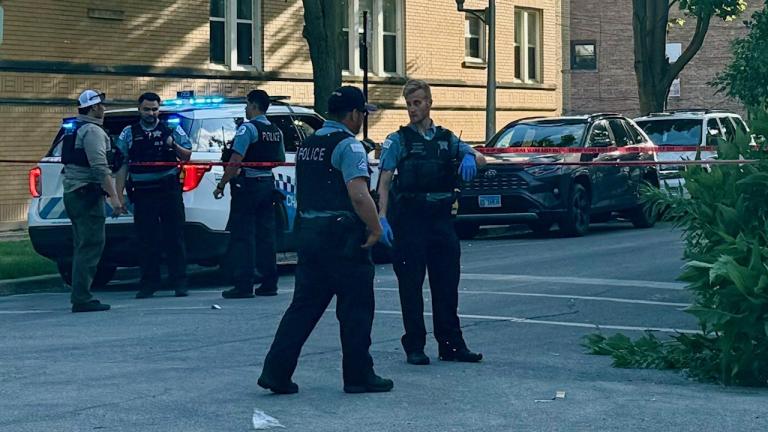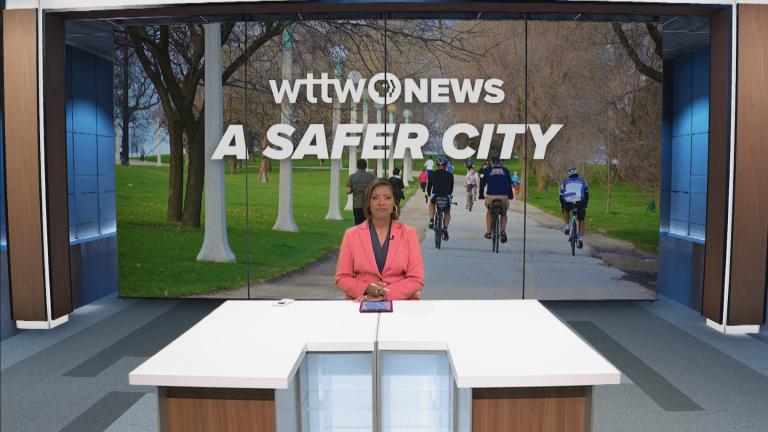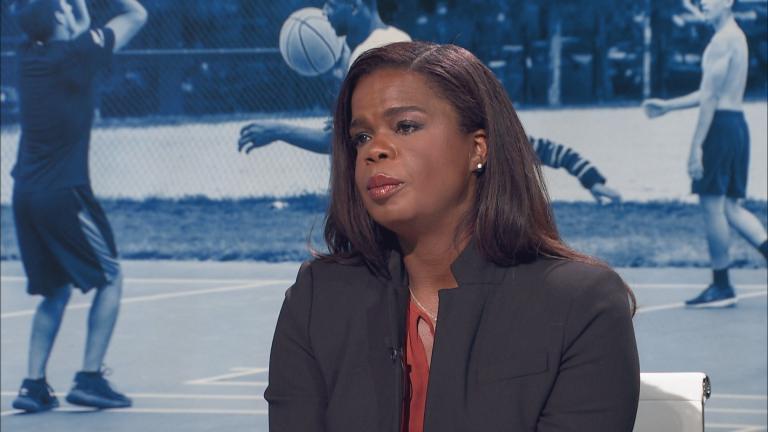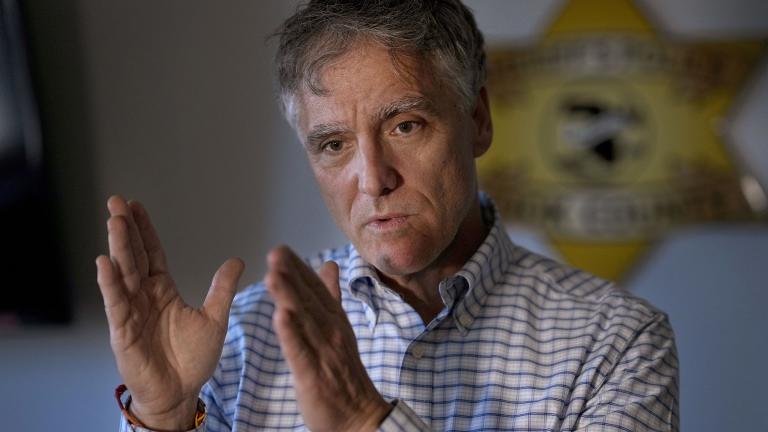 Outreach worker training with the Institute for Nonviolence Chicago (Credit: Metropolitan Peace Initiatives)
Outreach worker training with the Institute for Nonviolence Chicago (Credit: Metropolitan Peace Initiatives)
It was while Billy Deal was releasing music as “Bo Deal” — a career that led him to work with artists like Waka Flocka and Chief Keef — that street outreach work started to fall into his lap, he said.
“I started bringing artists to the hood, just motivating the kids in the hood, giving them words of encouragement,” Deal said. “I didn’t come to them in a corporate way or talk to them in a way that was above them. I met them where they were at.”
Deal used his social media platforms, which now have more than 270,000 followers combined, to shed light on the harms of engaging in a life of crime and violence. He spoke from experience, having previously been a member of a gang for more than 20 years, starting at the age of 16.
His turning point was when he was incarcerated in two separate instances around the time his children were born. The first time he was locked up, it was his daughter. The second time, it was his son.
“You have people giving you advice and telling you things, but no one is actually going to really make that change until they’re ready to make that change or see different alternative lifestyles and different ways of living,” Deal said.
Today, Deal works as a field manager at Metropolitan Peace Initiatives, where he helps coordinate with street outreach workers and organizations on the West Side to help facilitate a collaborative, citywide violence prevention effort called Communities Partnering 4 Peace, or CP4P.
It’s one of many violence prevention efforts across the city working to address the sharp increase in gun violence that Chicago, along with other major cities, experienced during the pandemic.
As of publication, the city has seen 319 people killed in shootings this year and 1,359 surviving shooting victims, a slight reduction compared to the same time period in 2022.
 Billy Deal, field manager at Metropolitan Peace Initiatives, speaks at a Metropolitan Peace Academy graduation. The training program aims to professionalize the field of street outreach. (Credit: Metropolitan Peace Initiatives)
Billy Deal, field manager at Metropolitan Peace Initiatives, speaks at a Metropolitan Peace Academy graduation. The training program aims to professionalize the field of street outreach. (Credit: Metropolitan Peace Initiatives)
‘Building a Better System’
CP4P, formed in 2017, brings together nearly a dozen community-based organizations in neighborhoods across the city most impacted by gun violence.
One of those organizations, Institute for Nonviolence Chicago, focuses its efforts in Austin and West Garfield Park.
Teny Gross, executive director of Institute for Nonviolence Chicago, says the partnership means there’s a network of outreach workers, victim advocates and case managers who can communicate with each other to help resolve conflicts that occur across neighborhoods.
On top of improving efficiency, Gross also said the partnership helps dramatically reduce competition among nonprofits in the violence prevention and outreach field — competition that he said is forced upon organizations through inconsistent funding and brand-making.
“This has helped us coordinate with each other and really try and build a larger picture goal for all of us, that we don’t always just think about our own nonprofits, but think about each other and building a better system,” Gross said.
CP4P’s approach to reducing gun violence is rooted in its street outreach work. This involves having credible messengers in neighborhoods who can build relationships with people. The goal is to identify potential issues and attempt to prevent violence from occurring through intervention methods like de-escalating tension and mediating interpersonal conflicts.
Preliminary results published in 2021 by the Northwestern Neighborhood & Network Initiative at Northwestern University’s Institute for Policy Research finds the number of fatal and non-fatal gunshot injuries of outreach participants across CP4P organizations was 20% lower in the 18 months following participation.
Partner organizations also help connect people at risk of becoming victims or perpetrators of violence to resources like family support, mental health and employment services.
Community events are also held throughout the year in an effort to reclaim safe spaces.
 (Credit: Metropolitan Peace Initiatives)
(Credit: Metropolitan Peace Initiatives)
Street Outreach as a Profession
Carla Galvan, field manager at Metropolitan Peace Initiatives, helps coordinate violence prevention and outreach efforts on the South Side. Her role involves helping connect shooting victims and their families at the hosptial to support services.
Galvan said she was led to this work because she herself is a survivor of gun violence. When she was 17, she was shot in the head by a stray bullet, which left her with a traumatic brain injury and a partial artificial skull.
The shooting occurred in South Chicago, which is one of the neighborhoods that Galvan now oversees in her work as field manager.
“The numbers that we see every day have skyrocketed, especially after COVID,” Galvan said. “I think it's really important, because of my own lived experience, that I always remind myself to not get desensitized from the work.”
Galvan and Deal are both graduates of the Metropolitan Peace Academy, a training program within Metropolitan Peace Initiatives that works to professionalize the field of street outreach.
A total of 335 street outreach workers and 88 case managers have graduated from the academy since it began.
The most important part of street outreach and preventing violence is finding workers who people in the community can relate to, Deal said. The vast majority of the street outreach workers he manages have formerly been involved in gangs themselves.
But Deal said he doesn’t think street outreach work is respected in the way it should be or that people understand the dangers and trauma involved in doing the job.
“Some people look at it and say, ‘Oh, well, there goes some ex-felons with jobs and they’re getting this money,’” Deal said. “Who better to touch the people in the community than the people who have been a part of this community and actually made it out to change? Nobody is more effective than a person like that.”
Contact Eunice Alpasan: @eunicealpasan | 773-509-5362 | [email protected]

